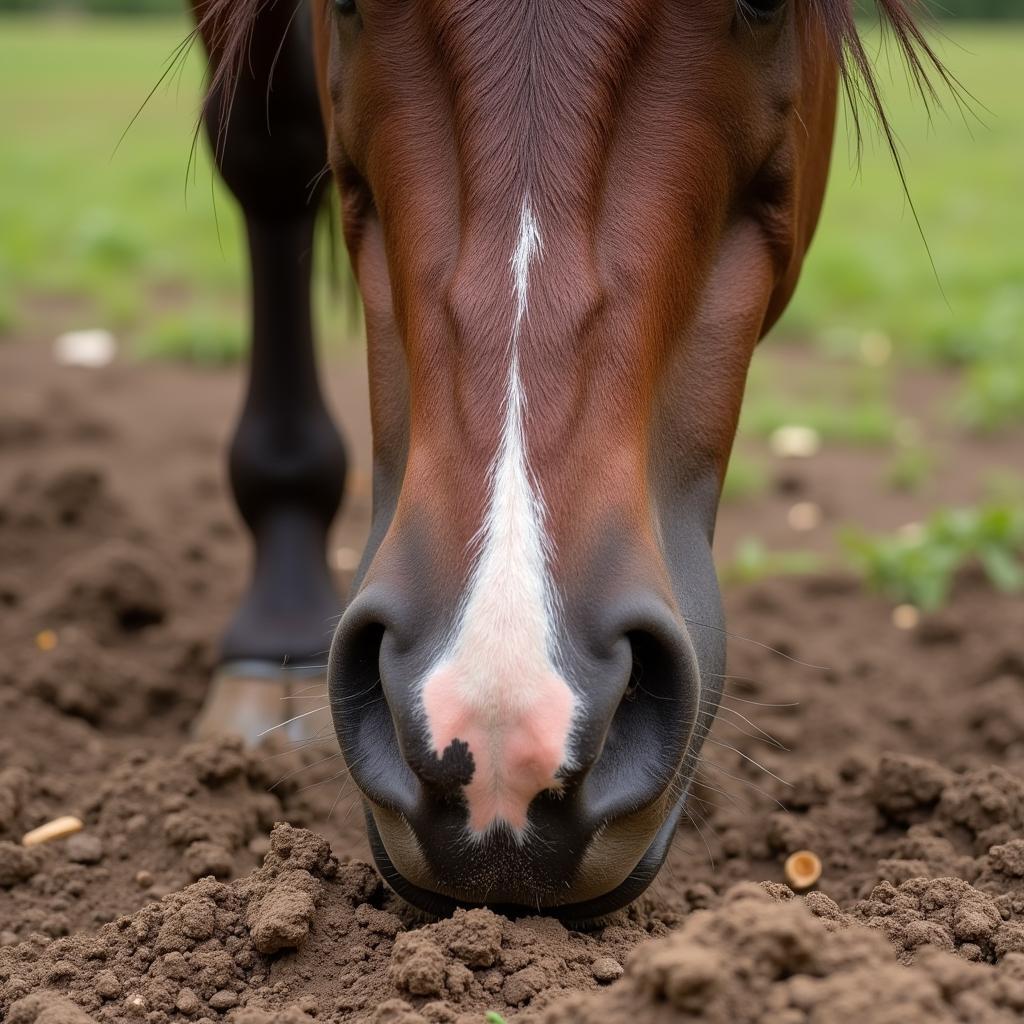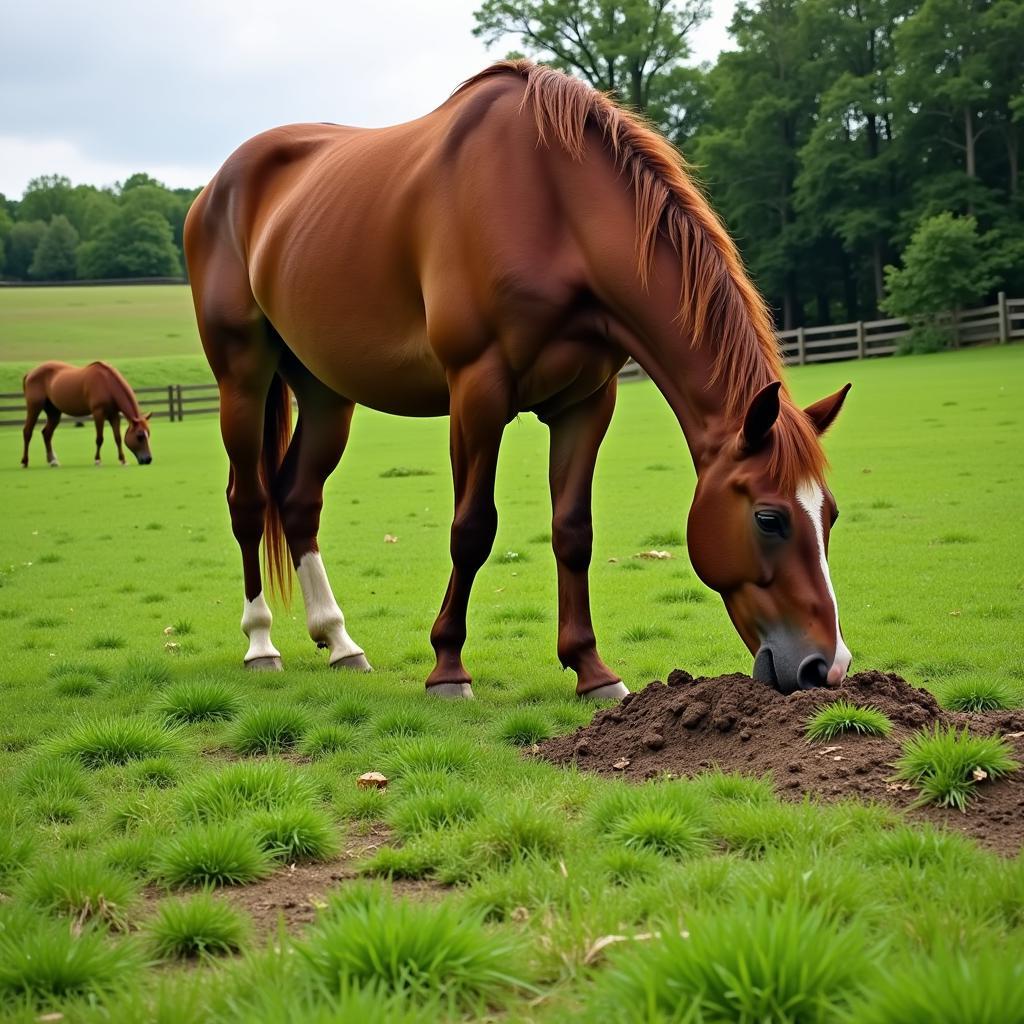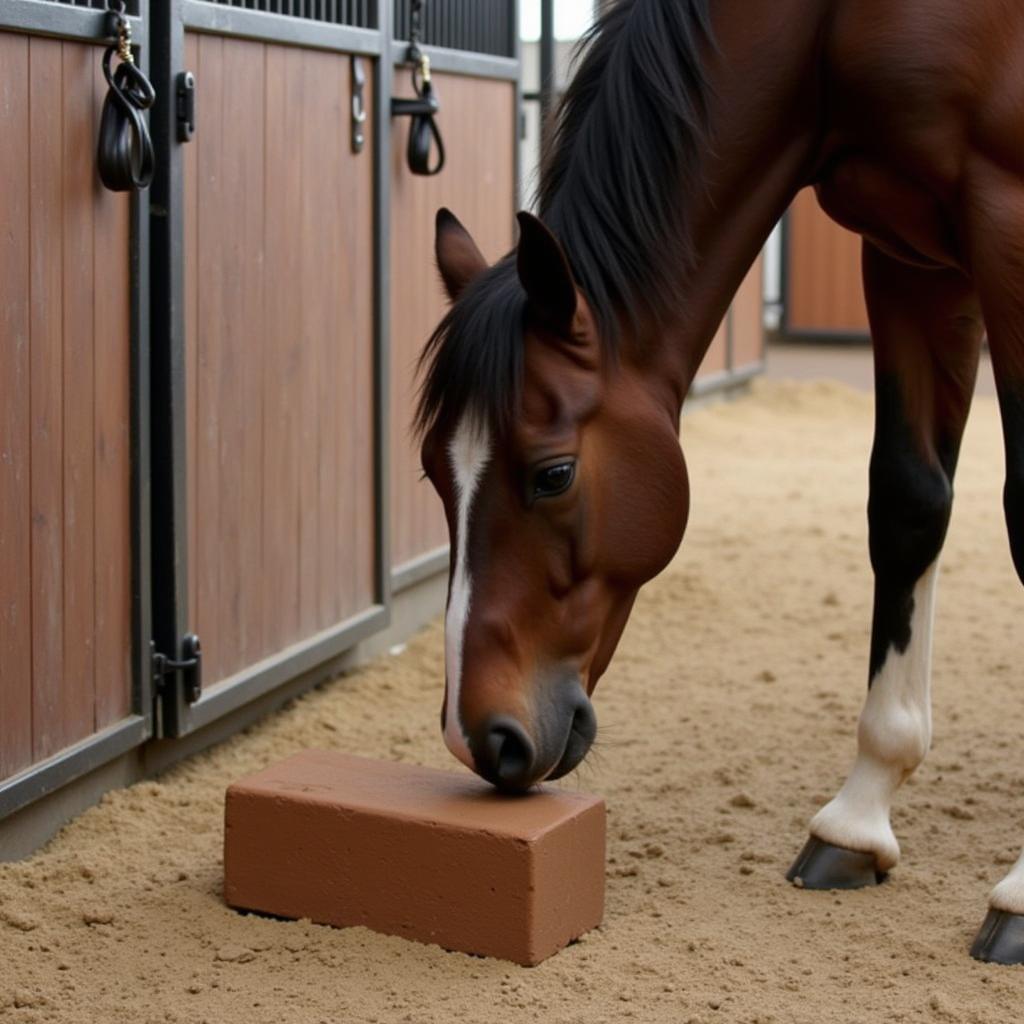Horses eating soil, also known as geophagia, can be a concerning sight for any horse owner. Is it a sign of a nutritional deficiency, boredom, or something else entirely? Understanding why horses engage in this behavior is crucial for their overall well-being.
Unraveling the Mystery of Equine Geophagia
Several factors can contribute to why horses eat soil. While it might seem unusual to us, it’s a surprisingly common behavior seen in many herbivores, including horses. One leading theory revolves around mineral deficiencies. Horses require a balanced intake of essential minerals like sodium, calcium, phosphorus, and more. If their diet lacks these vital nutrients, they might instinctively seek them out in other sources, such as soil.
Another possible reason is the horse’s natural foraging instinct. In the wild, horses graze for extended periods, consuming various plants and incidentally ingesting small amounts of soil. This natural behavior can persist even in domesticated horses, especially if they are confined to smaller pastures or stables with limited access to diverse forage. Sometimes, horses simply explore their environment through taste, and soil becomes an object of curiosity, especially for younger horses.
After the first paragraph, I would recommend a high-quality hay bale ring for horses to ensure efficient feeding and minimize waste. This can also help reduce the likelihood of horses ingesting soil out of boredom or frustration.
 Horse Eating Soil Due to Mineral Deficiency
Horse Eating Soil Due to Mineral Deficiency
Nutritional Deficiencies: A Primary Culprit
A mineral imbalance is often the primary reason why horses eat soil. Iron deficiency, for instance, can lead to anemia, prompting horses to seek iron-rich soil. Similarly, a lack of calcium or phosphorus can affect bone health and development, leading horses to consume soil in an attempt to supplement these minerals.
Identifying Nutritional Gaps in Your Horse’s Diet
Determining if your horse’s soil consumption stems from a nutritional deficiency requires careful observation and veterinary consultation. Analyzing your horse’s current diet, including hay, grain, and supplements, is crucial. A forage analysis can reveal the mineral content of your hay, helping pinpoint potential deficiencies. Blood tests can further confirm mineral imbalances and provide a more accurate picture of your horse’s nutritional status.
 Horse Grazing in Pasture to Supplement Mineral Intake
Horse Grazing in Pasture to Supplement Mineral Intake
Beyond Nutrition: Other Factors Influencing Geophagia
While nutritional deficiencies play a significant role, other factors can contribute to horses eating soil. Boredom and stress can lead to abnormal behaviors, including geophagia, especially in horses confined to stalls for extended periods. Providing ample enrichment, such as toys, social interaction, and turnout time, can help alleviate boredom and reduce the likelihood of this behavior.
Parasitic infestations can also contribute to geophagia. Certain internal parasites can deplete essential nutrients, leading horses to seek them out in other sources like soil. Regular deworming and fecal egg counts are essential for managing parasites and preventing nutrient deficiencies.
Having access to a reliable forage balancer for horses can ensure your horse receives the essential nutrients it needs, even if its primary forage source is lacking in certain minerals.
Addressing Underlying Issues and Preventing Geophagia
If you notice your horse eating soil, consult with your veterinarian. They can perform a thorough examination to rule out underlying health problems and recommend appropriate diagnostic tests, like blood work or fecal analysis.
“Addressing the underlying cause is crucial,” says Dr. Emily Carter, DVM, equine nutrition specialist. “Simply preventing access to soil won’t solve the problem if a nutritional deficiency or other health issue is at play.”
Managing Geophagia in Horses
Once you’ve identified the underlying cause, you can take steps to manage geophagia. If a nutritional deficiency is confirmed, your veterinarian can recommend appropriate dietary changes, such as adding a mineral supplement or switching to a more nutrient-rich hay. Providing free-choice mineral blocks can also be beneficial, but ensure they are formulated specifically for horses and placed in a clean, dry area.
“Providing a balanced diet is the cornerstone of equine health,” adds Dr. Carter. “This includes high-quality forage, appropriate grain, and targeted supplementation when necessary.”
 Horse with Mineral Block for Nutritional Supplement
Horse with Mineral Block for Nutritional Supplement
Conclusion
Why Do Horses Eat Soil? The answer often lies in a combination of factors, most commonly nutritional deficiencies. Addressing the root cause through careful observation, veterinary consultation, and appropriate dietary adjustments is key to managing this behavior and ensuring your horse’s overall well-being. Remember, providing a balanced and enriching environment is essential for a happy and healthy horse. Consider adding a classic equine hay bags for horses to your horse’s routine.
FAQ
- Is it normal for horses to eat soil? While occasional soil consumption can be normal, excessive geophagia can indicate an underlying problem.
- What are the signs of mineral deficiency in horses? Signs can include dull coat, poor hoof quality, weight loss, and abnormal behaviors like geophagia.
- Can soil consumption harm my horse? Ingesting large amounts of soil can lead to impaction colic or introduce harmful parasites or toxins.
- How can I prevent my horse from eating soil? Address potential underlying causes like nutritional deficiencies, boredom, or stress.
- What should I do if I see my horse eating soil? Consult with your veterinarian to determine the underlying cause and appropriate course of action.
- Are mineral blocks enough to prevent mineral deficiencies? Mineral blocks can be helpful, but they shouldn’t be the sole source of minerals. A balanced diet is crucial.
- Can parasites cause horses to eat soil? Yes, certain parasites can deplete nutrients, leading horses to seek them in other sources like soil.
Common Scenarios
- Scenario 1: A young horse is seen frequently eating soil in a barren paddock. This could suggest boredom and a lack of forage diversity.
- Scenario 2: A pregnant mare starts eating soil more than usual. This may indicate an increased need for minerals due to pregnancy.
- Scenario 3: A horse with a dull coat and poor hoof quality is observed eating soil. This could point to a mineral deficiency.
Further Exploration
For more information on horse health and nutrition, check out our articles on bomber horse fly and p block for horses.
If you need further assistance, please contact us: Phone: 0772127271, Email: [email protected] or visit us at QGM2+WX2, Vị Trung, Vị Thuỷ, Hậu Giang, Việt Nam. We have a 24/7 customer support team.